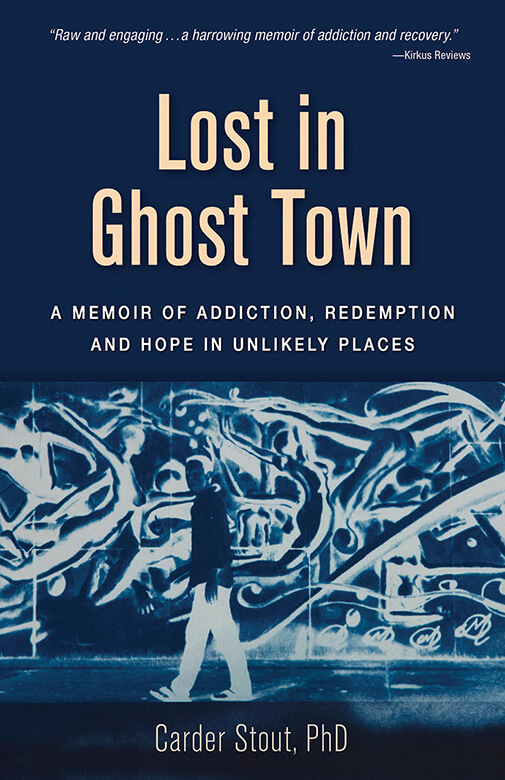May 27, 2020 | Posted in Addiction, Lost in Ghost Town
A drug addiction memoir breaks stereotypes and proves that addiction can happen to anyone

There is no easy way to write about drug addiction, just as there is no easy way to read about it. Lost in Ghost Town, author Carder Stout’s new memoir, somehow grabs the problem of addiction head-on while shattering common stereotypes behind it: by writing about a privileged kid, the book shows how drug addiction has no bounds when it comes to socio-economic status.

The timeline bounces back and forth between his childhood, starting at age seven, to his adult life in Venice, California. Growing up, he writes, his father was gone a lot, his mother rarely said ‘I love you,’ and his brother and nanny were his best friends. As a preteen, he experimented with alcohol and marijuana but eventually developed an eating disorder. “I forced myself to throw up with a simple contraction of my stomach muscles. It was easy for me,” he writes. “I had learned to purge my system at age 12, and for the decade that followed, I had suffered from bulimia.” Once he was sent off to a prestigious private school in New Hampshire, he tried cocaine for the first time. Completely uprooted and unsure of his life, he moved to New York after college and completely depleted his trust fund on a penthouse.
He writes about his past in montages featuring famous actors and celebrities with drug-filled late nights. “We were oversexed, libido-driven twenty-somethings without regular jobs to go to in the morning,” he writes. “We drank and laughed and carried on like we were invincible.” When he moved to Venice, or “Ghost Town,” drugs stopped being a social thing and developed into a habit — forcing him to grow more reclusive. “I began to distrust everyone around me. I looked over my shoulder to make sure I wasn’t being followed,” he writes, sharing his paranoia. He reaches a point where he can no longer hold a job, he is near homeless, with only a few friends and the voices in his head to keep him company. It feels like a hopeless case, but Stout tells his story with a redemptive ending.
Written post-recovery, Stout mixes psychology with true crime to create Lost in Ghost Town. In the foreword, Jonathan Marc Sherman, a playwright, writes that he believes that addiction can happen to anyone. “You might end up relating to it because of your own additions, whether those addictions are to alcohol and drugs, or food, shopping, sex, toxic relationships, pornography, gambling — the list goes on,” he says. Of course, like any memoir, there are times where it seems as if Stout might not make it through to the end of his cautionary tale. Although his story is dark and full of emotion, he writes about his journey in a way that keeps you turning the pages.
